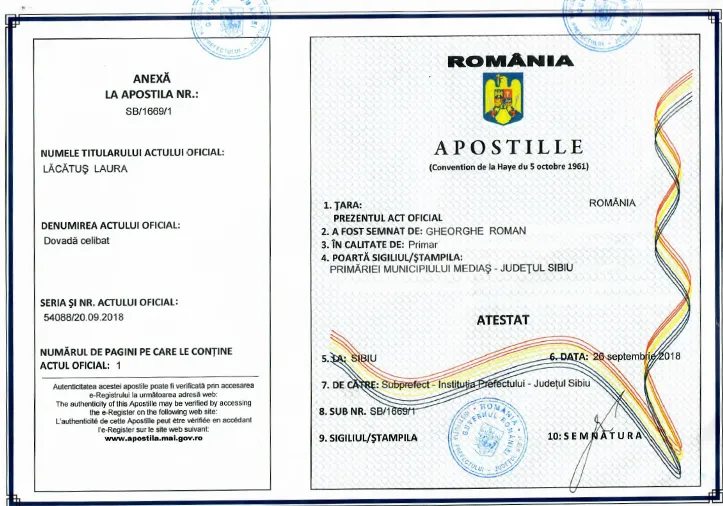Румыниядағы құжаттарға апостиль қою қызметін Schmidt & Schmidt компаниясы ұсынады.
Румыния 1961 жылғы 5 қазандағы Гаага конвенциясының қатысушысы болып табылады, ол құжаттарды апостиль арқылы жеңілдетілген тәртіппен заңдастыру рәсімін белгілейді. Румыния бұл конвенцияға 7 маусым 2000 жылы қосылып, ол елде 16 наурыз 2001 жылдан бастап күшіне енді. Содан кейін құжаттарға апостиль қою тәртібі бірнеше рет өзгертілді.
Румынияда құжаттарға апостиль қоюға ресми түрде құзырлы органдар – соттар мен префектуралар болып табылады. Кейбір жағдайларда нотариус құжатқа апостиль қоя алады. 2004 жылғы 1 қарашаға дейін апостильді Румынияның Сыртқы істер министрлігі мен Әділет министрлігінің уәкілетті қызметтерінде қоюға болатын.
Румынияда апостиль қоюға құзырлы органдар:
- Соттар – соттардан, прокуратура органдарынан, сот орындаушыларынан шыққан ресми құжаттарды және ресми мәлімдемелерді (мысалы, тіркеу немесе виза алу кезінде берілетін) апостильмен куәландыруға құқылы.
- Префектуралар (префекттің уәкілетті орынбасары немесе сирек жағдайда басқа уәкілетті тұлға) – әкімшілік, квалификациялық, медициналық және білім беру құжаттарын, сондай-ақ азаматтық жағдай актілерінің көшірмелерін апостильмен куәландыруға құқылы.
- Нотариустар – нотариалды құжаттарды апостильмен куәландыруға құқылы.
Румынияда берілген, апостильмен куәландырылған және нотариус арқылы расталған аудармасы бар құжаттар Қазақстанда заңды күшке ие болады.
Апостиль ресми билік органдары шығарған, румын тілінде 1998 жылдан кейін берілген құжаттарға қойылады. Бұрынғы жылдары шығарылған құжаттарды жаңарту қажет, тек содан кейін ресми түрде апостильмен куәландыруға болады.
Құжаттарды заңдастыру процесі олардың түпнұсқалығын тексеруден басталады. Осы рәсімнен өткеннен кейін құжатқа арнайы сертификат – апостиль қойылады. Көбінесе апостиль құжаттың артқы бетіне немесе бөлек параққа қойылады, содан кейін құжат тігіледі.
Қазіргі таңда құжатқа электрондық апостиль қою мүмкіндігі де бар.
Румыниядағы апостиль – төртбұрышты сертификат, жақтарының ұзындығы кемінде 9 см, румын тіліндегі мәтіні бар, «Apostille» деген міндетті тақырып және 1961 жылғы Гаага конвенциясына француз тіліндегі сілтемесі (Convention de La Haye du 5 octobre 1961). Сертификаттың мазмұны Гаага конвенциясында көрсетілген.

Румынияда апостиль қоюға болатын құжаттар
- Сот құжаттары
- Румынияның сауда реестрінен алынған үзінділер
- Прокуратура құжаттары
- Сот орындаушыларының құжаттары
- Нотариалды құжаттар
- Туу туралы куәліктер
- Неке туралы куәліктер
- Өлім туралы куәліктер
- Соттылық жайындағы анықтамалар
- Салықтық анықтамалар
- Румынияда тіркелгенін растайтын анықтамалар
- Отбасы құрамы туралы анықтамалар
- Жоғары білім туралы құжаттар
- Шетелдік мамандарға берілген дайындық туралы куәліктер
- Медициналық анықтамалар
- Шомылдыру және некелесу куәліктері
- Кеме қызметкерлерінің құжаттары
- Туризм органдары берген патенттер
- Зейнетақы құжаттары
- Квалификациялық сертификаттар
Апостиль қоюға жатпайтын құжаттар: кедендік, дипломатиялық, консулдық, экспедиторлық, коммерциялық құжаттар, паспорттар және басқа жеке куәліктер.
Апостильдің жарамдылық мерзімі шектелмеген, бірақ құжаттардың өзіне қатысты уақыт шектеулері қолданылуы мүмкін.
Апостиль мен консулдық заңдастыру арасындағы айырмашылықтар
Апостиль мен консулдық заңдастырудың ортақ белгісі – олар ресми құжаттың басқа елдің мекемелерінде қолданылуы үшін шынайылығын растайды. Алайда олардың арасында елеулі айырмашылықтар бар.
| Апостиль | Консулдық заңдастыру | |
|---|---|---|
| Шындық | Тек Гаага конвенциясына қатысушы елдер арасында ғана қолданылуы мүмкін. | Гаага конвенциясына қатыспайтын немесе қатысушы еместігінен бір немесе екі ел арасында, немесе бір тарап екінші тараптың қосылуына қарсы болған жағдайда қолданылады. |
| Алу қиындығы | Орташа. Апостиль алу үшін құжат берілген елдің уәкілетті органыға жүгіну қажет. | Жоғары. Консулдық заңдастыру үшін құжат берілген елдің әртүрлі органдарына және консулдықтарға жүгіну қажет |
| Алдын ала растау | Қажет емес. | Қажет. Құжатты берген органнан алдын ала растау қажет. |
| Мақсат елінің консулдығында заңдастыру | Мақсат елінің консулдығына жүгіну қажет емес. | Заңдастырудың соңғы кезеңі әдетте құжат берілген елде мақсат елінің консулдығында өтеді. |
Румыниядағы құжаттарды алу
Көбінесе азаматтық жағдайға қатысты құжаттар жоғалып кетеді немесе бүлінеді, немесе құжаттардың ағымдағы көшірмелерін алу қажет болады. Мұндай жағдайда құжаттардың дубликаттарын алу керек. Әсіресе, Румыниядан кеткен адамдар үшін бұл процедура күрделі болуы мүмкін. Біздің қызмет Румыниядағы құжаттарды қашықтықтан алуға мүмкіндік береді және біз құжатты әлемнің кез келген нүктесіне курьер арқылы жеткізе аламыз.
Құжаттардың нотариалды аудармасы
Көбінесе мемлекеттік органдар тек мемлекеттік тілде жасалған құжаттарды қабылдайды. Сол себепті, апостильмен расталған және шетел тілінде дайындалған құжаттарды мақсатты елде қолдану үшін, оларды аударып, аударманы нотариалды түрде растау қажет. Біздің қызмет арқылы сіз құжаттарды қазақ немесе орыс тіліне нотариалды аударуға тапсырыс бере аласыз.
Аударма апостильмен расталуы керек пе?
Бір елде берілген және басқа елде қолдану үшін қажет кез келген шетелдік құжат заңдастырылуы тиіс. Ескеретін жайт: Румынияда апостиль қойылған құжатты орыс тіліне аудару оны шетелдік құжат мәртебесінен босатпайды, яғни ол үшін қайтадан апостиль қажет болады. Сондықтан көптеген органдар Румынияда расталған аудармаларды қабылдамауы мүмкін. Бұл мәселені болдырмау үшін аудармаларды құжат қолданылатын елде жасау ұсынылады.
























































